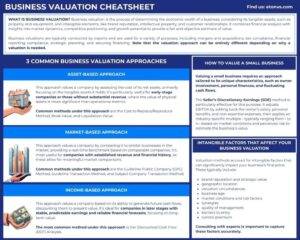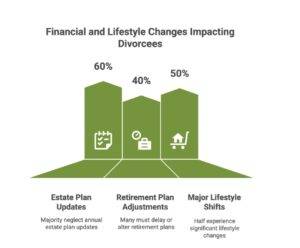
Forensic accounting divorce investigations play a vital role in reaching fair settlements during marital splits. Complex money matters require forensic accountants at Joey Friedman CPA to get into financial records and bring clarity to legal proceedings. These experts use their knowledge of accounting, auditing, and investigation techniques. Most people hire forensic accountants at Joey Friedman CPA to find hidden property during divorce. Without proper financial review, assets can stay hidden and prevent fair distribution between both parties. At Joey Friedman CPA, a leading Florida CPA firm, we specialize in forensic accounting and financial investigations.
Divorce cases come with complex financial situations that need careful review. A fair resolution requires uncovering every asset, income stream, and debt. Forensic accountants build complete financial pictures by analyzing income statements and expense reports. They track changes in a person’s net worth to spot signs of hidden income. These professionals help at different stages of divorce proceedings to show each party’s true financial position. Their work reveals any assets that weren’t disclosed earlier. The main goal focuses on full transparency between both parties to reach a fair settlement. This process involves splitting assets and debts, plus possible alimony payments. In this piece, we’ll look at how forensic accountants at Joey Friedman CPA uncover financial facts in divorce cases and help create fair settlements.
Uncovering Hidden Assets and Income Streams
Financial deception shows up often in messy divorces. Forensic accountants need to find hidden assets. , mostly men, hide their money in cryptocurrency . This makes tracking assets much harder. Forensic accountants need special methods to track down and value all marital assets properly.
Bank Statement Analysis and Transaction Tracing
Bank statements hold vital clues about hidden assets. A deep dive into these records helps forensic accountants at Joey Friedman CPA spot several red flags:
- Large withdrawals or transfers to mystery accounts that don’t add up
- Income on tax returns that’s missing from known bank accounts
- Cash transactions that bypass banks
- or possible shell companies Money going to unknown entities[2]
The bank deposit method helps forensic accountants at Joey Friedman CPA track income through different accounts to find all marital assets, even the hidden ones . They don’t just look at personal accounts. Business records might show money flowing into property purchases or investments under company names .
Tax Return Reconciliation for Undisclosed Income
Tax returns carry more weight than financial affidavits because they’re sworn statements with legal consequences . Forensic accountants look at several years of tax filings to spot anything fishy that points to hidden money or assets.
They focus on Schedule B for interest and dividends, Schedule C for business income, Schedule E for rental properties and partnerships, and K-1 forms that show each partner’s business income share [5]. A full picture shows gaps between reported income and actual spending, which might point to secret income sources [3].
Lifestyle analysis works best to uncover hidden assets. When someone claims they make little money but drives luxury cars, takes expensive trips, or pays private school fees, something doesn’t add up . Forensic accountants can figure out real earnings by looking at changes in assets, deposits, and spending, even without direct proof .
Use of Public Records and Data Aggregators
Public records are great for learning about secret property ownership or hidden money moves. Property records, court documents, business registrations, and professional licenses often reveal assets one spouse kept secret [6].
Smart forensic teams use special investigative tools to find business connections, offshore accounts, and suspicious money patterns [3]. They also check real estate records for properties under different names or trusts and look into shell companies that might hide true ownership [7].
Digital forensics plays a big role in modern divorce cases. Electronic trails from emails, payment records, and crypto transactions help track down hidden assets [1]. Crypto wallets are harder to trace, but special forensic methods can spot blockchain transactions that reveal unreported ownership [8].
Business Valuation in Divorce Forensics

Image Source: Eton Venture Services
Business valuation is the life-blood of divorce proceedings where private companies need proper assessment. Getting accurate valuations needs specialized forensic accounting expertise that will directly affect how assets are split.
Market vs. Income Approach in Private Company Valuation
Forensic accountants use three main ways to value businesses during divorce proceedings:
The market approach sets the value by comparing the business to similar ones that sold recently. This method works on a simple idea – if two things are alike and can replace each other, they must be worth the same [9]. This works great for franchise businesses because you can find many similar deals to compare [10]. But this method only works if you can find enough or if the industry lets you make meaningful comparisons similar companies[11].
The income approach is what most experts use. It bases the value on what the company earns now or might earn later [12]. This method projects future cash flows and converts them to present value using a return rate that matches the risks [13]. You could call it a fraction – future investor payments divided by investment risk [11].
The asset approach, also known as the cost approach, looks at what’s left of the business’s assets after taking out what it owes [12]. This works best when a business owns lots of physical assets like real estate or expensive equipment [10].
Adjustments for Key Person Risk and Surplus Assets
Key person discounts can affect business value by a lot in divorce cases. You might need this adjustment when the company’s success depends heavily on one person who’d be hard to replace [3]. Courts usually accept these discounts when that key person could leave and compete with the company [3].
You might need key person discounts when someone has:
- Management skills no one else can match at the same price
- Special relationships with stakeholders that bring better deals
- Unique technical knowledge that keeps the company ahead
- Strong employee loyalty where their exit might cause others to leave [3]
Some experts don’t use a separate discount percentage. Instead, they build key person risk into their method by adjusting return rates or changing price multipliers [3].
Loans to Shareholders and Their Impact on Equity Value
Shareholder loans need careful handling during business valuation in divorce cases. The difference between real debt and equity capital can change the final business value quite a bit [4]. Business owners sometimes borrow company money for personal use, which shows up as money owed to the company [4].
The IRS says must be treated as real debt with proper interest rates loans over $10,000[4]. Sometimes shareholders lend money to the business, which becomes a company debt [4]. This becomes especially important in divorce cases based on when someone acquired assets or took on debt [4].
The IRS looks at six things to decide if shareholder payments count as real loans:
- How much was borrowed
- Past earnings and dividends
- Rules about advances in shareholder agreements
- History of loan payments
- Whether the shareholder can repay based on yearly pay
- How much control the shareholder has over company decisions [4]
Valuation experts must decide whether to count shareholder loans as equity contributions or distributions. Their choice can change the company’s financial structure and its overall value [4].
Tracing and Separating Marital vs Non-Marital Assets

Image Source: Katie Lewis Family Law
One of the biggest challenges in divorce financial analysis is telling marital and non-marital assets apart. This classification affects which properties can be divided and which belong to one spouse. Financial records need careful review by forensic accountants at Joey Friedman CPA to categorize everything properly before division starts.
Asset Acquisition Date vs. Marriage Timeline
The timing of asset purchases matters most in property classification during divorce proceedings. are usually seen as marital property, whatever name is on the title. Property bought before marriage usually counts as separate property. Most courts recognize these non-marital assets:Assets acquired during the marriage
- Property owned prior to the marriage date
- Gifts received by one spouse individually, even during the marriage
- Inheritances received by one spouse, even during the marriage
- Personal injury damages for pain and suffering
- Assets designated as separate in valid prenuptial or postnuptial agreements
The spouse who claims an asset as separate must provide . Courts usually label contested assets as marital property if there’s no proper documentation.proof
Commingled Funds and Tracing Methodologies
Assets get commingled when separate property mixes with marital property and ownership lines blur. This happens often when people put inheritance money into joint accounts or use separate funds to improve a marital home. The legal process where separate property becomes marital property, by choice or accident, is called transmutation.
Forensic accountants use specific methods to rebuild financial histories:
- Direct tracing: They track specific funds from their separate source through various transactions to show they stayed separate
- Family expense tracing: This indirect method assumes family expenses came from community funds first, which kept separate property intact
The process needs complete records like bank statements, investment records, inheritance papers, deeds, mortgage documents, and tax returns. Forensic professionals look through these records to create a clear money trail that shows which assets or parts of assets stayed separate.
Real Estate and Investment Account Ownership Analysis
Real estate often represents the marriage’s biggest asset, so its classification really matters. Properties bought during marriage usually count as marital, even if only one name is on the deed. Yet, if someone made a down payment with separate money, that part might stay separate if properly traced.
Investment accounts create special challenges because they often mix separate and marital money. A retirement account started before marriage would be non-marital, but its growth during marriage might count as marital property. Market changes usually stay separate, while growth from contributions made during marriage typically becomes marital property.
These points make valuation dates vital in asset classification. Forensic accountants must decide whether to value assets on the separation date, filing date, settlement date, or trial date. They might pick different dates for different assets based on whether they’re active or passive.
Calculating Support: Cash Flow and Lifestyle Analysis

Image Source: Cornerstone Wealth Group
Cash flow analysis is a significant forensic accounting method that determines appropriate support levels in divorce proceedings. Forensic accountants analyze historical financial patterns to establish equitable maintenance calculations based on verifiable data rather than disputed claims.
Pre- and Post-Separation Spending Patterns
Lifestyle analysis helps forensic accountants at Joey Friedman CPA confirm or refute income claims by tabulating and analyzing income and expenses . This methodology creates a financial snapshot through bank statements, credit cards, tax returns, and other records to measure expenditure levels . A comparison between pre-separation and post-separation spending reveals whether a spouse has purposefully inflated expenses during divorce proceedings to secure more favorable settlements .
Spending analysis can also expose discrepancies between reported income and actual lifestyle, showing potentially hidden resources. Research shows that involve some form of alimony payment approximately 35% of divorces[15]. These financial assessments play a vital role in ensuring fair outcomes.
Reverse Duxbury and Lump-Sum Settlement Modeling
The Duxbury calculation estimates the capital amount needed to provide equal inflation-proofed installments over a recipient’s lifetime [16]. Divorcing couples can achieve a clean break by eliminating ongoing financial ties through this approach [17].
The Reverse Duxbury calculation works backward and determines what expenditure level a person could sustain based on a known lump sum [2]. This model helps negotiations by showing whether proposed settlements would adequately support ongoing needs. Research shows that than periodic arrangements lump-sum alimony agreements typically finalize 30% faster[15].
Income Normalization for Business Owners
Business-owning spouses need income normalization to adjust their reported earnings to reflect true economic benefit. This process identifies personal expenses covered by businesses, non-essential business costs, and retained earnings that might otherwise distort income calculations [18].
Forensic accountants improve cash flow accuracy by adding back various items. These include company vehicles, phones, excessive compensation, below-market related-party rent, and discretionary expenses . These adjustments create a more accurate picture of available income for support calculations.
Expert Witness Role in Divorce Litigation
Forensic accountants play a key role as expert witnesses in contentious divorce litigation. These professionals go beyond investigative work to provide vital evidence that helps judges and attorneys understand complex financial matters.
Preparation of Court-Admissible Reports
Court-admissible forensic accounting reports need meticulous preparation that shows every analytical step with precision. The best reports balance technical accuracy with accessibility and present complex financial evidence through clear, defensible explanations. These documents establish the assumptions used in calculations, outline the methods used, and justify conclusions drawn from data. Charts and exhibits accompany written findings to help legal audiences grasp intricate financial concepts.
Deposition and Trial Testimony Procedures
The groundwork for litigation support starts well before trial appearances. Forensic accountants work with attorneys to spot key financial issues, shape discovery strategies, and get ready for depositions. They develop analyzes, rebuttals, and visual aids that serve as the foundation for expert testimony. Their work reveals inconsistencies across tax returns and bank statements, reconstructs complex fund transfers, and helps calculate disputed financial claims. This preparation lets attorneys test their legal theories against financial evidence before stepping into the courtroom.
Cross-Examination Readiness and Report Defense
Expert testimony that carries weight needs thorough preparation for cross-examination challenges. Without doubt, an expert’s credibility depends on knowing how to explain both conclusions and methods. Good forensic witnesses stay composed under pressure and don’t take aggressive questioning personally or become defensive about their findings. They listen carefully to each question, give concise answers, and avoid sharing extra information that might invite more scrutiny. These effective witnesses acknowledge their limits when questions go beyond their expertise instead of making guesses.
Conclusion
Forensic accounting at Joey Friedman CPA reveals financial truths in divorce proceedings. These specialized professionals track hidden assets, assess businesses, and spot the difference between marital and separate property. They also provide expert testimony in court. Their work will give both parties fair settlements based on complete financial transparency. At Joey Friedman CPA, a leading Florida CPA firm, we specialize in forensic accounting and financial investigations.
Bank statement analysis, tax return reconciliation, lifestyle assessment, and public records examination are the foundations of detecting hidden assets. Digital forensics has become essential in modern investigations, especially when you have cryptocurrency and electronic payment trails that could stay hidden.
Business valuation needs expert knowledge to determine fair market value through proven methods. The right approach – market, income, or asset-based – depends on the business type. Factors like key person risk and shareholder loans affect final valuations by a lot. Forensic accountants must use their judgment to pick and apply these methods.
Asset classification needs forensic specialists to provide clarity. The difference between marital and non-marital property depends on when assets were acquired, mixed, or changed character. Careful tracing helps rebuild financial histories as assets change over time.
Cash flow analysis and support calculations go beyond just dividing assets. These calculations shape ongoing financial relationships between parties. Normal spending patterns before and after separation help create fair support arrangements. These analyzes create realistic financial plans for both parties’ future.
Expert witnesses translate complex financial matters into clear testimony. Their court-ready reports and preparation for depositions are a great way to get results in litigation. The core team must know how to handle tough cross-examination.
Forensic accounting is the life-blood of fair divorce settlements. The field grows with technology and changes in the digital world. Yet its main goal stays the same – to uncover financial truth through careful investigation. Couples going through divorce benefit by bringing in qualified forensic accountants at Joey Friedman CPA early. This step helps identify, value, and think about all assets properly during settlement. At Joey Friedman CPA, a leading Florida CPA firm, we specialize in forensic accounting and financial investigations.
Key Takeaways
Forensic accounting at Joey Friedman CPA serves as the financial detective work that ensures fair divorce settlements by uncovering hidden assets and providing complete financial transparency for both parties. At Joey Friedman CPA, a leading Florida CPA firm, we specialize in forensic accounting and financial investigations.
- Hidden assets are common: Approximately 20% of divorcing individuals hide assets, often using cryptocurrency or shell companies to conceal wealth from their spouse.
- Multiple investigation methods reveal truth: Bank statement analysis, tax return reconciliation, and lifestyle assessments work together to expose undisclosed income streams and concealed property.
- Business valuation requires specialized expertise: Private company valuations use market, income, or asset approaches, with adjustments for key person risk and shareholder loans significantly impacting final values.
- Asset timing determines ownership: Property acquired before marriage typically remains separate, while assets obtained during marriage are presumed marital property subject to division.
- Expert testimony translates complexity: Forensic accountants serve as crucial expert witnesses who present complex financial evidence in court-admissible reports and defendable testimony.
The ultimate goal of forensic accounting in divorce is achieving equitable settlements based on complete financial disclosure rather than partial or misleading information. Early engagement of qualified forensic professionals can prevent costly disputes and ensure all marital assets receive proper identification and valuation.
FAQs
Q1. How effective are forensic accountants at Joey Friedman CPA in uncovering hidden assets during divorce? Forensic accountants are highly effective in uncovering hidden assets. They use various techniques such as analyzing bank statements, reconciling tax returns, and examining public records to trace undisclosed income and property. Their expertise in financial investigation often reveals assets concealed through complex methods like cryptocurrency investments or shell companies.
Q2. What are the key methods used by forensic accountants at Joey Friedman CPA to discover hidden assets in a divorce? Forensic accountants employ several key methods to discover hidden assets, including bank statement analysis, tax return reconciliation, lifestyle assessment, and public records examination. They also use digital forensics to trace electronic payments and cryptocurrency transactions. These combined approaches help create a comprehensive financial picture and expose discrepancies.
Q3. How does a forensic accountant determine the value of a business in divorce proceedings? To value a business in divorce proceedings, forensic accountants at Joey Friedman CPA typically use market, income, or asset-based approaches. They consider factors such as the company’s earnings potential, comparable sales, and net assets. Adjustments are made for key person risk and shareholder loans. The chosen method depends on the specific characteristics of the business being valued.
Q4. What is the role of a forensic accountant in determining spousal support? Forensic accountants play a crucial role in determining spousal support by conducting cash flow and lifestyle analyzes. They examine pre- and post-separation spending patterns, normalize income for business owners, and use models like the Reverse Duxbury calculation to estimate sustainable expenditure levels. This helps ensure fair and accurate support calculations based on verifiable financial data.
Q5. How do forensic accountants at Joey Friedman CPA differentiate between marital and non-marital assets? Forensic accountants differentiate between marital and non-marital assets by examining the timing of asset acquisition in relation to the marriage, tracing the source of funds used for purchases, and analyzing any commingling of separate and marital property. They use specialized tracing methodologies to reconstruct financial histories and determine the true nature of contested assets, which is crucial for equitable distribution in divorce settlements.




